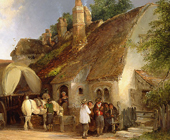 Many wonder how an economic system can survive without a massive interest bearing credit to facilitate trade and liquidity. Historian Fernand Braudel provides an interesting description of an interest-free flexible system in eighteenth century Europe. He writes:
Many wonder how an economic system can survive without a massive interest bearing credit to facilitate trade and liquidity. Historian Fernand Braudel provides an interesting description of an interest-free flexible system in eighteenth century Europe. He writes:
“And yet, if we are to believe Defoe, the entire hierarchy of trade, from top to bottom, operated on the same principle. From the small shopkeeper to the businessman, from the artisan to the manufacturer, everyone lived on credit, that is on forward sales and purchases…Even the time given for repayment, which everyone allowed and received in turn could be extended: ‘Not one man in twenty keeps to his time…On every merchant’s books, alongside the stocks of goods, there regularly figured his assets (credit) and liabilities (debts). The wise trader sought to maintain a balance, but never abandoned these forms of credit which in the end amounted to a huge mass, multiplying the volume of trade by four or five. The entire commercial system depended on it. …The important point is that this was a kind of credit inherent in the commercial system, generated by it – an internal form of credit which was interest-free.” Fernand Braudel, Civilization and Capitalism 15th-18th Century: The Wheels of Commerce, University of California Press, Berkeley, 1992, p. 385.
[like url=https://www.facebook.com/ReturnToOrder.org]


